Unit 4 I used to be afraid of the dark.表格式教案(5课时)
文档属性
| 名称 | Unit 4 I used to be afraid of the dark.表格式教案(5课时) |  | |
| 格式 | doc | ||
| 文件大小 | 182.5KB | ||
| 资源类型 | 教案 | ||
| 版本资源 | 人教新目标(Go for it)版 | ||
| 科目 | 英语 | ||
| 更新时间 | 2021-09-05 11:47:05 | ||
图片预览





文档简介
第4单元
I
used
to
be
afraid
of
the
dark.
知识目标
掌握used
to的用法。
能力目标
能听懂Did
you
use
to…?等含有used
to的对话,完成听力任务;学会运用used
to句型谈论自己与他人过去的习惯。
情感目标
每个人都是变化发展的,自身的优点、缺点也不是一成不变的。我们要用发展的眼光经常进行自我检查,改进不足,不断完善自我。
Section
A(1a~2d)…………………………………………………………………………………………1课时
Section
A(3a~4c)…………………………………………………………………………………………1课时
Section
B(1a~1e)…………………………………………………………………………………………1课时
Section
B(2a~2f)……………………………………………………………………………………………1课时
Section
B(3a~Self
Check)…………………………………………………………………………………1课时
Section
A
第1课时(1a~2d)
类别
学习重点
重点单词
humorous,
silent,
helpful,
score
重点短语
used
to,
be
interested
in,
from
time
to
time,
in
class
重点句式
1.Mario
used
to
be
short.2.What’s
he
like
now?3.This
party
is
such
a
great
idea.4.It’s
been
three
years
since
we
last
saw
our
primary
school
classmates.
课前预习
写一写
1.有幽默感的humorous
2.沉默的silent3.有用的helpful
4.得分;进球score
译一译
1.时常from
time
to
time2.过去常常used
to3.对……感兴趣be
interested
in
背一背
1.他过去很矮,对吗?He
used
to
be
short,didn’t
he?2.她过去在课堂上总是很安静。She
was
always
silent
in
class.
新课导入
T:What’s
the
weather
like
today?S1:It’s
a
little
cloudy
and
cold.T:What
do
I
look
like?S2:You
are…T:What
did
I
use
to
be
like?…
新课展示
【完成教材1a~2d的教学任务】1.1a学生完成表格,然后练习对话。典例参考—What
did
the
boy
use
to
be
like?—He
used
to
be
short.—What
is
he
like
now?—He
is
tall
now.2.1b听1b录音,并完成1b的句子。3.1c小组练习,让学生借助1a、1b中的信息练习对话,并找几组学生展示他们的对话。4.2a听2a的录音,在听到的单词前面做记号。5.2b再听录音,根据录音内容填空。6.2c小组练习,学生就2b有关Paula过去和现在的信息练习对话。7.2d处理学生预习后的重难点,让学生两人一组读对话,然后请2-3对学生表演对话。【语法提要】1.used
to(1)used
to
do…过去常常……。如:He
used
to
get
up
at
six
in
the
morning,but
now
he
gets
up
at
seven.他过去早晨六点起床,现在七点起床。(2)get/be
used
to
doing习惯于做……。如:I
get/am
used
to
getting
up
at
six.我习惯于六点起床。(3)
be
used
to
do
被用来做……。如:
The
pens
are
used
to
write.钢笔是用来写字的。2.such和soso
和such
的运用,一般so后用形容词或副词,such后用含形容词的名词词组。如:Today
is
so
nice
that
I
can
go
fishing.=Today
is
such
a
nice
day
that
I
can
go
fishing.今天天气这么好我可以去钓鱼了。3.sincesince用作连词时,意为“自从;自……以来”。主句常用完成时,且动词需用延续性动词。since后面接从句,从句要用一般过去时态。相当于“for+一段时间”,对应的主句是相应持续性动词的完成时态。I
have
had
the
pen
for
two
years.=It’s
been
two
years
since
I
bought
the
pen.=I
bought
the
pen
two
years
ago.这支钢笔我买了两年了。They
have
been
away
for
half
an
hour.=It’s
been
half
an
hour
since
they
left.=They
left
half
an
hour
ago.他们离开了半个小时。【问题探究】1.We
used
to
B
in
the
evening,but
now
we
get
used
to
_______
early
in
the
morning.A.exercise;
exercise
B.exercise;
exercisingC.exercised;
exercising2.根据上下文在横线上填恰当的单词。—What
is
he
like
now?—He
is
very
tall
and
outgoing.
活学活练
(B)1.He
gets
used
to
_______
English
aloud
every
morning.A.readB.readingC.reads(B)2.—What
do
you
think
of
the
book?—It
is
______
that
I
can’t
wait
to
read
it.A.so
good
bookB.such
a
good
bookC.such
good
book(B)3.The
movie
______
for
two
hours.A.has
begunB.has
been
onC.began
布置作业:教师引导学生课后完成本课时对应练习,并预习下一课时内容。
教学反思
本单元的功能话题是用“used
to”谈论你的或某人的朋友过去是什么样子的或过去常常做什么,所以在第一节课时,有必要让学生通过大脑风暴大量接触“what
you
used
to
be
like”的用语。本节课通过大量听和说的练习让学生正确掌握used
to的用法。在教学过程中,我采用小组合作的方式,通过一个个的听说任务的完成,结束了这节课的教学,效果很好。
教学过程中老师的疑问:
教师点评和总结:
Section
A第2课时(3a~4c)
类别
学习重点
重点单词
interview,
dare,
require,
background,
guard,
speech,
public,
Asian,
European,
African,
British,
private,
deal,
ton
重点短语
deal
with,
in
public,
take
up,
not…
anymore,
hang
out,
in
front
of,
worry
about,
give
up,
make
it
重点句式
1.I
didn’t
use
to
be
popular
in
school,but
now
I
get
tons
of
attention
everywhere
I
go.2.You
can
never
imagine
how
difficult
the
road
to
success
is.
课前预习
写一写
1.背景background
2.采访interview3.敢于dare
4.私人的private5.保卫guard
6.需要require
译一译
1.从事take
up2.处理deal
with3.小心;注意be
careful
about4.不再not…anymore
背一背
1.我不得不注意我说的和做的。I
have
to
be
careful
about
what
I
say
or
do.2.和朋友闲逛现在对我来说几乎不可能因为总有保镖在我周围。Hanging
out
with
friends
is
almost
impossible
for
me
now
because
there
are
always
guards
around
me.
新课导入
T:How
many
famous
people
do
you
know?S1:I
know
Yao
Ming
is
a
very
famous
basketball
player.T:Do
you
know
what
he
used
to
be?S1:…
新课展示
【完成教材3a~4c的教学任务】1.3a学生快速阅读本节文章,然后在方框三个句子前写序号用以概括各段大意。参考答案:2312.3b让学生在不看该文段的情况下填单词完成句子。参考答案:①anymore
②popular
③hang
out
④worry
about3.处理3a重难点,学生朗读。4.4a学生用所给单词、词组,模仿Grammar
Focus
造句。参考答案:②My
mom
used
to
have
curly
hair.She
didn’t
use
to
have
straight
hair.③Jerry
used
to
read
books
on
European
history.She
didn’t
use
to
read
books
on
African
culture.④Sandy
used
to
teach
British
English.She
didn’t
use
to
teach
American
English.5.4b学生根据表格提供的信息写文段。6.4c学生按本节要求填表,让若干学生报告自己和同伴的情况。【语法提要】1.took
uptook
up意为“开始做,通常指开始某项工作、某个爱好等,尤其指做以前从未做过的事或作为消遣的事。took
up
doing
sth.意为“开始做某事”。2.deal
with
和do
with
两者都意为
“处理;对待”,但搭配不同:how
to
deal
with
sth.;what
to
do
with
sth.。如:How
do
you
deal
with
your
sadness?=What
do
you
do
with
your
sadness?你怎么处理你的伤心情绪?3.in
front
of注意in
front
of和in
the
front
of
的区别。前者意义是“在(……外部的)前面”,后者意义是“在(……内部的)前面”。如:There
is
a
tree
in
front
of
the
classroom.在教室前面有一棵树。There
is
a
blackboard
in
the
front
of
the
classroom.教室前面有一块黑板。4.too
muchtoo
much太多,修饰名词。如:There
is
too
much
water
on
the
ground.地上水太多。much
too
太,修饰形容词、副词。
如:It
is
much
too
cold.天太冷。【问题探究】1.用所给单词或短语的适当形式填空。(1)Yao
Ming
doesn’t
take
up
playing
(play)
basketball
now.(2)He
deals
with
(deal
with)the
problem
successfully
last
week.2.根据汉语提示填空。(1)To
sing
in
front
of
(在……前面)
the
crowd
gives
her
happiness
.(2)The
students
have
too
much
(太多)homework
to
do
every
day.
活学活练
(B)1.The
old
man
________
writing
after
he
retired.A.took
upB.takes
upC.taking
upD.to
take
up(B)2.—Did
you
do
something
to
_______
with
your
bad
grades?—No.I
don’t
know
_______
to
do.A.do;whatB.deal;whatC.deal;how
(C)3.—Where
does
the
boy
named
Li
Lei
sit?—He
sits
_______
the
girl
in
red.A.in
the
front
ofB.at
the
back
ofC.in
front
of
(B)4.It
is
______
windy
and
there
is
_______
dust
on
the
table.A.too
much;
much
tooB.much
too;
too
muchC.too
much;
too
much
布置作业:教师引导学生课后完成本课时对应练习,并预习下一课时内容。
教学反思
本课时继续学习用used
to谈论人们常常做什么,并且学会通过阅读分析文章信息。我采用自主学习的方式,让学生根据Grammar
Focus,归纳Section
A部分语法重点,同时通过4a、4b、4c的活动,学以致用used
to的用法。
教学过程中老师的疑问:
教师点评和总结:
Section
B第3课时(1a~1e)
类别
学习重点
重点单词
ant
重点短语
in
the
past,
be
nervous
about
重点句式
1.I
used
to
be
on
the
soccer
team.2.I
used
to
be
nervous
about
tests
all
the
time.
课前预习
写一写
蚂蚁ant
译一译
1.担心worry
about2.一直all
the
time3.……怎么样what
about4.在过去in
the
past
背一背
1.我过去不喜欢考试。I
didn’t
use
to
like
tests.2.我过去对考试总是紧张。I
used
to
be
nervous
about
tests
all
the
time.
新课导入
T:What
do
you
like
to
do
now
and
what
do
you
hate
to
do
now?S1:I
like
to
do…S2
I
hate
to
do…T:What
did
you
use
to
like
to
do
in
the
past
and
what
did
you
use
to
hate
to
do
in
the
past?…
新课展示
【完成教材1a~1e的教学任务】1.1a学生在代表其小时候喜欢做的事情的图片前做记号,并相互交流。典例参考I
used
to
like
P.E.class
in
the
past.2.1b
and
1e学生在1a
方框中再多写几项其小时候喜欢做的事情,然后看同伴所喜欢的是不是自己所喜欢的,模仿1e的对话进行比较,练习对话。3.1c学生听听力材料,找出听到的句子。4.1d学生再听听力材料,根据所听内容填空。【语法提要】1.on
the
soccer
teamon
the
soccer
team加入了足球队。在……球队可以用“on
the
…team”表示。
如:I
am
on
the
school
basketball
team.我加入了学校篮球队。2.be
nervous
about
be
nervous
about
对……感到紧张。如:I
am
nervous
about
speaking
in
front
of
you.在你面前说话我紧张。【问题探究】1.我的哥哥过去常在排球队。My
brother
used
to
be
on
the
volleyball
team
.2.对于在公众面前发表演讲,他感到很紧张。He
is
nervous
about
making
a
speech
in
public.
活学活练
(A)1.I
am
very
happy
to
be
______
the
swimming
team.A.on
B.for
C.of(C)2.The
boy
felt
very
nervous
_______
riding
the
bike.A.with
B.in
C.about
布置作业:教师引导学生课后完成本课时对应练习,并预习下一课时内容。
教学反思
本课时通过大量的听说练习进一步学习有关过去是什么样子或过去常常做什么的话题。这一节课的课堂教学始终以听说为主,以听开始,以说结束,这一课时的听力练习,难度稍微大了一些,主要以听较长的对话为主,因而教师听前的引导很重要,可以在听第一遍的时候,给一个比较容易理解的问题,总之引导要循序渐进。
教学过程中老师的疑问:
教师点评和总结:
Section
B第4课时(2a~2f)
类别
学习重点
重点单词
examination,
pride,
influence,
fail,
absent,
seldom,
exactly,
proud
重点短语
be
proud
of,
in
person,
take
pride
in,
no
longer,
make
a
decision,
to
one’s
surprise,
take
care
of,
pay
attention
to
重点句式
1.It’s
hard
to
believe
that
he
used
to
have
difficulties
in
school.2.He
became
less
interested
in
studying.3.She
advised
them
to
talk
with
their
son
in
person.
课前预习
写一写
1.不常;很少seldom2.影响influence3.缺席;不在absent4.确切地exactly
译一译
1.缺席;逃课be
absent
from2.亲自in
person3.即使;尽管even
though4.照顾take
care
of
背一背
1.有时他逃课,并且考试不及格。Sometimes
he
was
absent
from
classes
and
failed
his
examinations.2.他们为我做的每件好事感到骄傲。They
take
pride
in
everything
good
that
I
do.
新课导入
Ask
the
students
how
many
people
there
are
in
their
family,who
they
are,what
they
do,where
they
are,how
they
get
along
with
their
parents
or
their
grandparents,if
they
caused
trouble
for
his
family
and
why.
新课展示
【完成教材2a~2f的教学任务】1.2a帮助学生根据题目He
Studies
Harder
Than
He
Used
to
猜测具体有哪些问题。2.2b让学生再读该文段,把本节四个句子放在文中正确的地方。3.2c让学生浏览该文段,找出具体有哪些问题并画线。4.2d帮助学生猜测方框四个单词或词组的意义。5.处理2b重难点,学生朗读。6.2e学生用方框中单词、词组填空。7.2f根据提示,学生分组编写Li
Wen
和其父母之间的那次对话并练习、表演。【语法提要】1.adviseadvise
sb.
(not)
to
do
sth.意为“建议某人(不)做某事”。如:The
boss
advised
him
to
leave
as
soon
as
possible.老板建议他尽快离开。2.even
thougheven
though意为“尽管,即使,纵然”,一般用来引导让步状语从句。如:The
boy
can
look
after
his
sister
even
though
he
is
six
years
old.尽管这个男孩只有6岁,但他可以照顾他的妹妹。3.take
pride
intake
pride
in相当于be
proud
of,意为“为……感到自豪”。in为介词,其后可接名词、代词或动词ing形式。如:Mr
Green
takes
pride
in
his
son.=Mr
Green
is
proud
of
his
son.格林先生为他儿子感到自豪。
【问题探究】根据汉语意思完成句子。1.我妈妈建议我把零花钱捐给贫困孩子。My
mother
advises
me
to
give
my
pocket
money
to
poor
children.2.即使他很累,但他仍坚持训练。He
goes
on
training
even
though
he
is
tired.3.他爸爸对他做的事情感到自豪。His
father
takes
great
pride
in
what
he
has
done.
活学活练
(B)1.We
advise
parents
_________
their
children
at
home
alone
in
order
to
keep
them
away
from
danger.A.not
leave
B.not
to
leave
C.leave
D.not
leave(D)2.Many
teachers
go
on
working
_______
they
are
sick.A.if
B.unless
C.so
D.even
though(A)3.The
teacher
________
his
students.A.takes
pride
inB.take
pride
inC.takes
pride
ofD.take
proud
of
布置作业:教师引导学生课后完成本课时对应练习,并预习下一课时内容。
教学反思
本节课是一节阅读课,重点是让学生能阅读李文过去所有的问题的文章并完成练习。在引导学生阅读的过程中,学习重点单词和短语以及阅读的方法——学会预测,学会根据上下文猜测词语的意思,培养阅读能力。
教学过程中老师的疑问:
教师点评和总结:
Section
B第5课时(3a~Self
Check)
类别
学习重点
重点单词
introduction,
general
重点短语
help
sb.
do,
have
a
influence
on
sb.
重点句式
1.Kate’s
grandparents
have
had
a
great
influence
on
her.2.The
teacher
takes
pride
in
helping
his
students
win
the
English
competition.
课前预习
写一写
1.总的;普遍的general2.介绍introduction
译一译
1.在过去的几年里in
the
last
few
years2.大多数时间most
of
the
time
背一背
1.他大多数时候保持沉默,很少和其他人说话。He
remained
silent
most
of
the
time
and
seldom
talked
to
other
people.2.如果你老不上课,你考试会不及格的。If
you
are
always
absent
from
class,you
will
fail
the
examination.
新课导入
Ask
the
students
what
they
used
to
be
like,and
talk
about
the
changes
that
have
happened
to
them.
新课展示
【完成教材3a~Self
Check的教学任务】1.3a结合情景导入,让更多学生描述他们的变化。2.3b部分学生展示其写的How
I’ve
Changed!3.Self
Check
1学生用方框里的单词、词组完成句子,处理完重难点后,学生朗读。4.Self
Check
2学生口述其完成的句子。【语法提要】1.help
sb.
(to)
do
sth.help
sb.
(to)
do
sth.意为“帮助某人做某事”。如:He
often
helps
me
do
the
homework.他经常帮助我做作业。2.silentsilent“沉默的”,形容词,对应的名词是silence,注意灵活运用。如:He
remained
silent
most
of
the
time
and
seldom
talked
to
other
people.=He
was
in
silence
most
of
the
time
and
seldom
talked
to
other
people.【问题探究】1.She
often
helps
(help)
his
mom
do
the
housework.2.He
was
silent
(silence)
all
the
time
during
the
meeting.
活学活练
(A)1.I
sometimes
help
him
_______
English
and
he
helps
me
________
my
Chinese.A.study;withB.studying;studyingC.study;studies(C)2.His
_______
made
us
angry.A.silent
B.quiet
C.silence
布置作业:教师引导学生课后完成本课时对应练习,并预习下一课时内容。
教学反思
这一课时是本单元的总结课,
used
to句型的运用对学生来说相对较容易。我先让学生课前读记本单元重点词汇、短语、句型,然后在课中先引导学生完成Self
Check的两个练习。最后,引导学生完成3a、3b的活动,这样也就完成了第三个重点:练习一篇关于你的外表、个性品质和习惯的变化的短文。
教学过程中老师的疑问:
教师点评和总结:
PAGE
I
used
to
be
afraid
of
the
dark.
知识目标
掌握used
to的用法。
能力目标
能听懂Did
you
use
to…?等含有used
to的对话,完成听力任务;学会运用used
to句型谈论自己与他人过去的习惯。
情感目标
每个人都是变化发展的,自身的优点、缺点也不是一成不变的。我们要用发展的眼光经常进行自我检查,改进不足,不断完善自我。
Section
A(1a~2d)…………………………………………………………………………………………1课时
Section
A(3a~4c)…………………………………………………………………………………………1课时
Section
B(1a~1e)…………………………………………………………………………………………1课时
Section
B(2a~2f)……………………………………………………………………………………………1课时
Section
B(3a~Self
Check)…………………………………………………………………………………1课时
Section
A
第1课时(1a~2d)
类别
学习重点
重点单词
humorous,
silent,
helpful,
score
重点短语
used
to,
be
interested
in,
from
time
to
time,
in
class
重点句式
1.Mario
used
to
be
short.2.What’s
he
like
now?3.This
party
is
such
a
great
idea.4.It’s
been
three
years
since
we
last
saw
our
primary
school
classmates.
课前预习
写一写
1.有幽默感的humorous
2.沉默的silent3.有用的helpful
4.得分;进球score
译一译
1.时常from
time
to
time2.过去常常used
to3.对……感兴趣be
interested
in
背一背
1.他过去很矮,对吗?He
used
to
be
short,didn’t
he?2.她过去在课堂上总是很安静。She
was
always
silent
in
class.
新课导入
T:What’s
the
weather
like
today?S1:It’s
a
little
cloudy
and
cold.T:What
do
I
look
like?S2:You
are…T:What
did
I
use
to
be
like?…
新课展示
【完成教材1a~2d的教学任务】1.1a学生完成表格,然后练习对话。典例参考—What
did
the
boy
use
to
be
like?—He
used
to
be
short.—What
is
he
like
now?—He
is
tall
now.2.1b听1b录音,并完成1b的句子。3.1c小组练习,让学生借助1a、1b中的信息练习对话,并找几组学生展示他们的对话。4.2a听2a的录音,在听到的单词前面做记号。5.2b再听录音,根据录音内容填空。6.2c小组练习,学生就2b有关Paula过去和现在的信息练习对话。7.2d处理学生预习后的重难点,让学生两人一组读对话,然后请2-3对学生表演对话。【语法提要】1.used
to(1)used
to
do…过去常常……。如:He
used
to
get
up
at
six
in
the
morning,but
now
he
gets
up
at
seven.他过去早晨六点起床,现在七点起床。(2)get/be
used
to
doing习惯于做……。如:I
get/am
used
to
getting
up
at
six.我习惯于六点起床。(3)
be
used
to
do
被用来做……。如:
The
pens
are
used
to
write.钢笔是用来写字的。2.such和soso
和such
的运用,一般so后用形容词或副词,such后用含形容词的名词词组。如:Today
is
so
nice
that
I
can
go
fishing.=Today
is
such
a
nice
day
that
I
can
go
fishing.今天天气这么好我可以去钓鱼了。3.sincesince用作连词时,意为“自从;自……以来”。主句常用完成时,且动词需用延续性动词。since后面接从句,从句要用一般过去时态。相当于“for+一段时间”,对应的主句是相应持续性动词的完成时态。I
have
had
the
pen
for
two
years.=It’s
been
two
years
since
I
bought
the
pen.=I
bought
the
pen
two
years
ago.这支钢笔我买了两年了。They
have
been
away
for
half
an
hour.=It’s
been
half
an
hour
since
they
left.=They
left
half
an
hour
ago.他们离开了半个小时。【问题探究】1.We
used
to
B
in
the
evening,but
now
we
get
used
to
_______
early
in
the
morning.A.exercise;
exercise
B.exercise;
exercisingC.exercised;
exercising2.根据上下文在横线上填恰当的单词。—What
is
he
like
now?—He
is
very
tall
and
outgoing.
活学活练
(B)1.He
gets
used
to
_______
English
aloud
every
morning.A.readB.readingC.reads(B)2.—What
do
you
think
of
the
book?—It
is
______
that
I
can’t
wait
to
read
it.A.so
good
bookB.such
a
good
bookC.such
good
book(B)3.The
movie
______
for
two
hours.A.has
begunB.has
been
onC.began
布置作业:教师引导学生课后完成本课时对应练习,并预习下一课时内容。
教学反思
本单元的功能话题是用“used
to”谈论你的或某人的朋友过去是什么样子的或过去常常做什么,所以在第一节课时,有必要让学生通过大脑风暴大量接触“what
you
used
to
be
like”的用语。本节课通过大量听和说的练习让学生正确掌握used
to的用法。在教学过程中,我采用小组合作的方式,通过一个个的听说任务的完成,结束了这节课的教学,效果很好。
教学过程中老师的疑问:
教师点评和总结:
Section
A第2课时(3a~4c)
类别
学习重点
重点单词
interview,
dare,
require,
background,
guard,
speech,
public,
Asian,
European,
African,
British,
private,
deal,
ton
重点短语
deal
with,
in
public,
take
up,
not…
anymore,
hang
out,
in
front
of,
worry
about,
give
up,
make
it
重点句式
1.I
didn’t
use
to
be
popular
in
school,but
now
I
get
tons
of
attention
everywhere
I
go.2.You
can
never
imagine
how
difficult
the
road
to
success
is.
课前预习
写一写
1.背景background
2.采访interview3.敢于dare
4.私人的private5.保卫guard
6.需要require
译一译
1.从事take
up2.处理deal
with3.小心;注意be
careful
about4.不再not…anymore
背一背
1.我不得不注意我说的和做的。I
have
to
be
careful
about
what
I
say
or
do.2.和朋友闲逛现在对我来说几乎不可能因为总有保镖在我周围。Hanging
out
with
friends
is
almost
impossible
for
me
now
because
there
are
always
guards
around
me.
新课导入
T:How
many
famous
people
do
you
know?S1:I
know
Yao
Ming
is
a
very
famous
basketball
player.T:Do
you
know
what
he
used
to
be?S1:…
新课展示
【完成教材3a~4c的教学任务】1.3a学生快速阅读本节文章,然后在方框三个句子前写序号用以概括各段大意。参考答案:2312.3b让学生在不看该文段的情况下填单词完成句子。参考答案:①anymore
②popular
③hang
out
④worry
about3.处理3a重难点,学生朗读。4.4a学生用所给单词、词组,模仿Grammar
Focus
造句。参考答案:②My
mom
used
to
have
curly
hair.She
didn’t
use
to
have
straight
hair.③Jerry
used
to
read
books
on
European
history.She
didn’t
use
to
read
books
on
African
culture.④Sandy
used
to
teach
British
English.She
didn’t
use
to
teach
American
English.5.4b学生根据表格提供的信息写文段。6.4c学生按本节要求填表,让若干学生报告自己和同伴的情况。【语法提要】1.took
uptook
up意为“开始做,通常指开始某项工作、某个爱好等,尤其指做以前从未做过的事或作为消遣的事。took
up
doing
sth.意为“开始做某事”。2.deal
with
和do
with
两者都意为
“处理;对待”,但搭配不同:how
to
deal
with
sth.;what
to
do
with
sth.。如:How
do
you
deal
with
your
sadness?=What
do
you
do
with
your
sadness?你怎么处理你的伤心情绪?3.in
front
of注意in
front
of和in
the
front
of
的区别。前者意义是“在(……外部的)前面”,后者意义是“在(……内部的)前面”。如:There
is
a
tree
in
front
of
the
classroom.在教室前面有一棵树。There
is
a
blackboard
in
the
front
of
the
classroom.教室前面有一块黑板。4.too
muchtoo
much太多,修饰名词。如:There
is
too
much
water
on
the
ground.地上水太多。much
too
太,修饰形容词、副词。
如:It
is
much
too
cold.天太冷。【问题探究】1.用所给单词或短语的适当形式填空。(1)Yao
Ming
doesn’t
take
up
playing
(play)
basketball
now.(2)He
deals
with
(deal
with)the
problem
successfully
last
week.2.根据汉语提示填空。(1)To
sing
in
front
of
(在……前面)
the
crowd
gives
her
happiness
.(2)The
students
have
too
much
(太多)homework
to
do
every
day.
活学活练
(B)1.The
old
man
________
writing
after
he
retired.A.took
upB.takes
upC.taking
upD.to
take
up(B)2.—Did
you
do
something
to
_______
with
your
bad
grades?—No.I
don’t
know
_______
to
do.A.do;whatB.deal;whatC.deal;how
(C)3.—Where
does
the
boy
named
Li
Lei
sit?—He
sits
_______
the
girl
in
red.A.in
the
front
ofB.at
the
back
ofC.in
front
of
(B)4.It
is
______
windy
and
there
is
_______
dust
on
the
table.A.too
much;
much
tooB.much
too;
too
muchC.too
much;
too
much
布置作业:教师引导学生课后完成本课时对应练习,并预习下一课时内容。
教学反思
本课时继续学习用used
to谈论人们常常做什么,并且学会通过阅读分析文章信息。我采用自主学习的方式,让学生根据Grammar
Focus,归纳Section
A部分语法重点,同时通过4a、4b、4c的活动,学以致用used
to的用法。
教学过程中老师的疑问:
教师点评和总结:
Section
B第3课时(1a~1e)
类别
学习重点
重点单词
ant
重点短语
in
the
past,
be
nervous
about
重点句式
1.I
used
to
be
on
the
soccer
team.2.I
used
to
be
nervous
about
tests
all
the
time.
课前预习
写一写
蚂蚁ant
译一译
1.担心worry
about2.一直all
the
time3.……怎么样what
about4.在过去in
the
past
背一背
1.我过去不喜欢考试。I
didn’t
use
to
like
tests.2.我过去对考试总是紧张。I
used
to
be
nervous
about
tests
all
the
time.
新课导入
T:What
do
you
like
to
do
now
and
what
do
you
hate
to
do
now?S1:I
like
to
do…S2
I
hate
to
do…T:What
did
you
use
to
like
to
do
in
the
past
and
what
did
you
use
to
hate
to
do
in
the
past?…
新课展示
【完成教材1a~1e的教学任务】1.1a学生在代表其小时候喜欢做的事情的图片前做记号,并相互交流。典例参考I
used
to
like
P.E.class
in
the
past.2.1b
and
1e学生在1a
方框中再多写几项其小时候喜欢做的事情,然后看同伴所喜欢的是不是自己所喜欢的,模仿1e的对话进行比较,练习对话。3.1c学生听听力材料,找出听到的句子。4.1d学生再听听力材料,根据所听内容填空。【语法提要】1.on
the
soccer
teamon
the
soccer
team加入了足球队。在……球队可以用“on
the
…team”表示。
如:I
am
on
the
school
basketball
team.我加入了学校篮球队。2.be
nervous
about
be
nervous
about
对……感到紧张。如:I
am
nervous
about
speaking
in
front
of
you.在你面前说话我紧张。【问题探究】1.我的哥哥过去常在排球队。My
brother
used
to
be
on
the
volleyball
team
.2.对于在公众面前发表演讲,他感到很紧张。He
is
nervous
about
making
a
speech
in
public.
活学活练
(A)1.I
am
very
happy
to
be
______
the
swimming
team.A.on
B.for
C.of(C)2.The
boy
felt
very
nervous
_______
riding
the
bike.A.with
B.in
C.about
布置作业:教师引导学生课后完成本课时对应练习,并预习下一课时内容。
教学反思
本课时通过大量的听说练习进一步学习有关过去是什么样子或过去常常做什么的话题。这一节课的课堂教学始终以听说为主,以听开始,以说结束,这一课时的听力练习,难度稍微大了一些,主要以听较长的对话为主,因而教师听前的引导很重要,可以在听第一遍的时候,给一个比较容易理解的问题,总之引导要循序渐进。
教学过程中老师的疑问:
教师点评和总结:
Section
B第4课时(2a~2f)
类别
学习重点
重点单词
examination,
pride,
influence,
fail,
absent,
seldom,
exactly,
proud
重点短语
be
proud
of,
in
person,
take
pride
in,
no
longer,
make
a
decision,
to
one’s
surprise,
take
care
of,
pay
attention
to
重点句式
1.It’s
hard
to
believe
that
he
used
to
have
difficulties
in
school.2.He
became
less
interested
in
studying.3.She
advised
them
to
talk
with
their
son
in
person.
课前预习
写一写
1.不常;很少seldom2.影响influence3.缺席;不在absent4.确切地exactly
译一译
1.缺席;逃课be
absent
from2.亲自in
person3.即使;尽管even
though4.照顾take
care
of
背一背
1.有时他逃课,并且考试不及格。Sometimes
he
was
absent
from
classes
and
failed
his
examinations.2.他们为我做的每件好事感到骄傲。They
take
pride
in
everything
good
that
I
do.
新课导入
Ask
the
students
how
many
people
there
are
in
their
family,who
they
are,what
they
do,where
they
are,how
they
get
along
with
their
parents
or
their
grandparents,if
they
caused
trouble
for
his
family
and
why.
新课展示
【完成教材2a~2f的教学任务】1.2a帮助学生根据题目He
Studies
Harder
Than
He
Used
to
猜测具体有哪些问题。2.2b让学生再读该文段,把本节四个句子放在文中正确的地方。3.2c让学生浏览该文段,找出具体有哪些问题并画线。4.2d帮助学生猜测方框四个单词或词组的意义。5.处理2b重难点,学生朗读。6.2e学生用方框中单词、词组填空。7.2f根据提示,学生分组编写Li
Wen
和其父母之间的那次对话并练习、表演。【语法提要】1.adviseadvise
sb.
(not)
to
do
sth.意为“建议某人(不)做某事”。如:The
boss
advised
him
to
leave
as
soon
as
possible.老板建议他尽快离开。2.even
thougheven
though意为“尽管,即使,纵然”,一般用来引导让步状语从句。如:The
boy
can
look
after
his
sister
even
though
he
is
six
years
old.尽管这个男孩只有6岁,但他可以照顾他的妹妹。3.take
pride
intake
pride
in相当于be
proud
of,意为“为……感到自豪”。in为介词,其后可接名词、代词或动词ing形式。如:Mr
Green
takes
pride
in
his
son.=Mr
Green
is
proud
of
his
son.格林先生为他儿子感到自豪。
【问题探究】根据汉语意思完成句子。1.我妈妈建议我把零花钱捐给贫困孩子。My
mother
advises
me
to
give
my
money
to
poor
children.2.即使他很累,但他仍坚持训练。He
goes
on
training
even
though
he
is
tired.3.他爸爸对他做的事情感到自豪。His
father
takes
great
pride
in
what
he
has
done.
活学活练
(B)1.We
advise
parents
_________
their
children
at
home
alone
in
order
to
keep
them
away
from
danger.A.not
leave
B.not
to
leave
C.leave
D.not
leave(D)2.Many
teachers
go
on
working
_______
they
are
sick.A.if
B.unless
C.so
D.even
though(A)3.The
teacher
________
his
students.A.takes
pride
inB.take
pride
inC.takes
pride
ofD.take
proud
of
布置作业:教师引导学生课后完成本课时对应练习,并预习下一课时内容。
教学反思
本节课是一节阅读课,重点是让学生能阅读李文过去所有的问题的文章并完成练习。在引导学生阅读的过程中,学习重点单词和短语以及阅读的方法——学会预测,学会根据上下文猜测词语的意思,培养阅读能力。
教学过程中老师的疑问:
教师点评和总结:
Section
B第5课时(3a~Self
Check)
类别
学习重点
重点单词
introduction,
general
重点短语
help
sb.
do,
have
a
influence
on
sb.
重点句式
1.Kate’s
grandparents
have
had
a
great
influence
on
her.2.The
teacher
takes
pride
in
helping
his
students
win
the
English
competition.
课前预习
写一写
1.总的;普遍的general2.介绍introduction
译一译
1.在过去的几年里in
the
last
few
years2.大多数时间most
of
the
time
背一背
1.他大多数时候保持沉默,很少和其他人说话。He
remained
silent
most
of
the
time
and
seldom
talked
to
other
people.2.如果你老不上课,你考试会不及格的。If
you
are
always
absent
from
class,you
will
fail
the
examination.
新课导入
Ask
the
students
what
they
used
to
be
like,and
talk
about
the
changes
that
have
happened
to
them.
新课展示
【完成教材3a~Self
Check的教学任务】1.3a结合情景导入,让更多学生描述他们的变化。2.3b部分学生展示其写的How
I’ve
Changed!3.Self
Check
1学生用方框里的单词、词组完成句子,处理完重难点后,学生朗读。4.Self
Check
2学生口述其完成的句子。【语法提要】1.help
sb.
(to)
do
sth.help
sb.
(to)
do
sth.意为“帮助某人做某事”。如:He
often
helps
me
do
the
homework.他经常帮助我做作业。2.silentsilent“沉默的”,形容词,对应的名词是silence,注意灵活运用。如:He
remained
silent
most
of
the
time
and
seldom
talked
to
other
people.=He
was
in
silence
most
of
the
time
and
seldom
talked
to
other
people.【问题探究】1.She
often
helps
(help)
his
mom
do
the
housework.2.He
was
silent
(silence)
all
the
time
during
the
meeting.
活学活练
(A)1.I
sometimes
help
him
_______
English
and
he
helps
me
________
my
Chinese.A.study;withB.studying;studyingC.study;studies(C)2.His
_______
made
us
angry.A.silent
B.quiet
C.silence
布置作业:教师引导学生课后完成本课时对应练习,并预习下一课时内容。
教学反思
这一课时是本单元的总结课,
used
to句型的运用对学生来说相对较容易。我先让学生课前读记本单元重点词汇、短语、句型,然后在课中先引导学生完成Self
Check的两个练习。最后,引导学生完成3a、3b的活动,这样也就完成了第三个重点:练习一篇关于你的外表、个性品质和习惯的变化的短文。
教学过程中老师的疑问:
教师点评和总结:
PAGE
同课章节目录
- Unit 1 How can we become good learners.
- Section A
- Section B
- Unit 2 I think that mooncakes are delicious!
- Section A
- Section B
- Unit 3 Could you please tell me where the restroom
- Section A
- Section B
- Unit 4 I used to be afraid of the dark.
- Section A
- Section B
- Unit 5 What are the shirts made of?
- Section A
- Section B
- Review of Units 1-5
- Unit 6 When was it invented?
- Section A
- Section B
- Unit 7 Teenagers should be allowed to choose their
- Section A
- Section B
- Unit 8 It must belong to Carla.
- Section A
- Section B
- Unit 9 I like music that I can dance to.
- Section A
- Section B
- Unit 10 You're supposed to shake hands.
- Section A
- Section B
- Review of Units 6-10
- Unit 11 Sad movies make me cry.
- Section A
- Section B
- Unit 12 Life is full of the unexpected
- Section A
- Section B
- Unit 13 We're trying to save the earth!
- Section A
- Section B
- Unit 14 I remember meeting all of you in Grade 7.
- Section A
- Section B
- Review of Units 11-14
